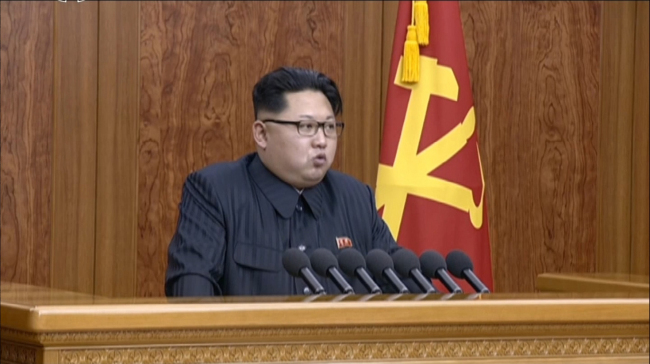Uncertainties hang over inter-Korean relations, as North Korean leader Kim Jong-un sharpened his criticism against South Korea while expressing his will for bilateral dialogue to enhance cross-border ties during his New Year’s address on Friday.
 |
| North Korean leader Kim Jong-un delivers his New Year`s speech on Friday. (Yonhap) |
During the 29-minute address, broadcast by the North’s official Korean Central Television, Kim blasted Seoul’s unification policy, arguing that Seoul “begged foreign forces” to help it with “Koreans’ internal issue” in a move tantamount to an “act of treachery.”
He also pledged to develop and produce “various military strike vehicles,” indicating that he would push for the development of new weapons systems such as a submarine-launched missile and longer-range ballistic missiles.
However, he pledged to make “active efforts” to improve cross-border ties.
“(We) will sit down and discuss the issues of our nation and reunification heart to heart with anyone who truly yearns for national reconciliation, unity, peace and reunification,” Kim said, wearing his signature black suit.
In his speech last year, he hinted at the possibility of an inter-Korean summit. But this time, he did not mention the possibility — a reason analysts said his desire to enhance inter-Korean relations was perceived to have somewhat weakened.
“While calling for opening an era of independent unification, Kim expressed his displeasure over President Park Geun-hye’s diplomacy regarding her unification policy,” said Cheong Seong-chang, senior research fellow at the local think tank the Sejong Institute.
“This hints that it will not be easy to resume inter-Korean government talks this year.”
Kim spent a large portion of his speech underscoring the importance of “building an economically strong nation and creating a new turning point in developing the economy and enhancing people’s livelihoods.”
“To develop the economy and improve people’s livelihoods, we should make all-out efforts in each sector — electricity, coal, metal industries, light industry, construction, agriculture, livestock industry and fisheries,” Kim said.
He particularly stressed the role of state economic organizations for the “full-scale establishment” of a North Korean-style economic management method.
Details about the North’s economic management method are expected to be unveiled during the national congress of the ruling Workers’ Party, which is slated for early May.
Observers say that under the method, Pyongyang may officially allow the operations of erstwhile black markets, expand autonomy in individuals’ production activities and permit limited personal possession of property.
Economic development has been a key issue for Kim, as the country prepares for the seventh party congress, which will be the first in 36 years. The congress is one of the party’s most crucial events, in which the leader wraps up the party’s feats and unveils a national vision for the future.
“In a socialist country that is led by the party, the congress is the most important event,” said Chang Yong-seok, a senior researcher at the Institute for Peace and Unification Studies at Seoul National University
“For the congress, there should be economic achievements for the leader to show off to the party members, a reason economic development has to be a priority issue.”
Apparently to restore ties with China and forge a positive external environment, which is conducive to its economic development, Kim did not mention Pyeongyang’s “bungjin” policy of simultaneously developing the economy and nuclear weapons.
During his October speech to mark the 70th anniversary of the founding of the party, the reclusive leader also refused to mention the policy in a move that analysts say was intended not to further provoke neighboring states.
By Song Sang-ho (sshluck@heraldcorp.com)

